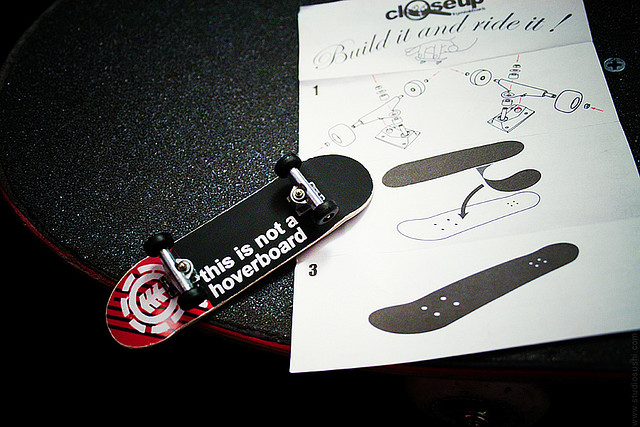In the rock opera, Rent, the drag queen Angel is a visionary fashionista and a poverty-stricken, HIV-positive bohemian living in East Village New York. At her funeral her friend Maureen remembers Angel could make a dress from a tablecloth, and the next season The Gap would be selling the apparel in its stores.
Angel’s plight came to mind last week when the comedy site Funny or Die produced a fake ad for a bogus antigravity hover board. The video, which features a parade of celebs, went viral because enough followers fell asleep in physics class and thought the product was real. Just think about that: antigravity has been invented and the first time we hear about it is in an ad for a floating skateboard. People, seriously?
The hover board video is certainly not the first time a brand has commoditized what was once the organic process of something astonishing, frightening or unique becoming popular online. Nor is it the first time that a medium or meme has been hijacked by commercial interests. There is a sad history of it.
Let’s look at radio at the beginning of the 20th century. Back then, radio (often via Morse code) was strictly the domain of the hobbyist. These were earnest men (almost exclusively) who built and improved their own gear and filled the airwaves with messages, music and emergency bulletins. It’s no exaggeration to say they collectively and altruistically invented radio.
But less than two decades later, the U.S. government, citing concerns over security during the First World War, took away key frequencies from the “hams.” Then in 1921, the then-fledgling RCA broadcast the Dempsey/Carpentier fight to 300,000 listeners and the era of commercial radio (which the U.S. Department of Congress prohibited amateurs from engaging in) was born. Four years later, RCA became NBC. National mainstream broadcasting rose from what, less than 30 years earlier, was only the daydream of the now-marginalized hobbyists.
Almost a century later, the pattern repeated itself with podcasting. In 2000 the idea of enclosing a subscribable audio file in an RSS feed (Really Simple Syndication) was a technical innovation created by programmer Dave Winer. It would take a couple years before pioneering podcasters like Dave Slusher, Dawn and Drew Domkus and Adam Curry not only started creating podcasts but, in Curry’s case, figured out how to get podcasts automatically into iTunes. By 2004, USA Today and other mainstream media were mentioning this odd thing, podcasting. That same year the Rabble Podcast Network was born. But, it wasn’t until mid-2005, when Apple added a podcast section to the popular iTunes Music Store, that the popularity of the then almost exclusively amateur-produced podcasts took off.
But only two years later, those podcasts were bumped from the high-profile first tier of podcast postings in the iTunes Music Store by podcasts produced by the BBC, NPR and the CBC. Many of the podcasts the stations released were merely repackaged versions of their radio shows. They lacked the show notes, user contributions and communities that grew up around the early podcasts. Once again, a medium invented and grown by amateurs became the domain, at least in the public eye, of the mainstream.
Radio was once the electronic conversations of enthusiasts, podcasts were once a way of the everyman to reach everybody and viral videos used to be the product of the authentic discovery and the selfless sharing by a delighted online community. They are all worse, I think, for being supplanted by an ersatz commercial substitute. In Rent, Angel dies without being recognized for her avant garde genius. I hope advertising agencies and brands who steal and spoil a wonderful aspect of the web appreciate what it is they are killing, before, like a phoney hover board, it ever got off the ground.
Wayne MacPhail has been a print and online journalist for 25 years, and is a long-time writer for rabble.ca on technology and the Internet.
Photo: ames | studiosushi™/flickr



